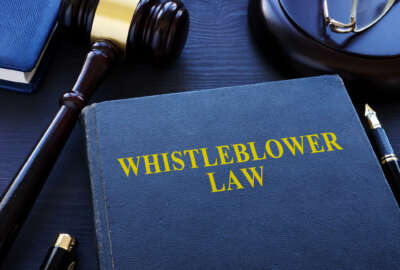Justice Department’s new whistleblower program
The Justice Department recently said it would test a new rewards program for whistleblowers, who report "significant corporate misconduct."
The Justice Department recently said it would test a new rewards program for whistleblowers, who report “significant corporate misconduct.” Payments will come from assets forfeited by defendants in both civil and criminal cases. For an assessment of the program, the Federal Drive with Tom Temin talked with whistleblower attorney Stephen Kohn of Kohn, Kohn & Colapinto.
Interview Transcript:
Tom Temin Does this program break ground with respect to coverage of whistleblowers, do you think?
Stephen Kohn We don’t know. It has potential. Some of the statements made are, I would say, wrong-headed. There are like five really good whistleblower laws, and they all follow a similar, procedure. So, this one, which is discretionary, which means the Justice Department is kind of making it up. They’re proposing ideas that are completely counter to the best practices, but nothing’s written in stone. We hope they’re going to listen, and we can make it work.
Tom Temin And what right now does in the proposal run counter to best practice.
Stephen Kohn Also going all the way back to the Civil War, the original False Claims Act, and every single powerful whistleblower law since. It’s known that in white collar crime and corruption, your best sources are often participants. They’re not the kingpin. They didn’t plan and initiate it. But like, for example, in a Swiss banking case and we’ve done many, a banker is your best source yet. Swiss bankers have all violated U.S. law. So, under her proposal, they want to exclude all participants. Which means if you’re a secretary, you put a stamp on a letter that has some, you know, false claim in it. You’re disqualified. It makes no sense. And it’s counter to all the other laws. Let’s hope they fix it.
Tom Temin Yeah. And how has justice been otherwise in terms of getting whistleblowers paid in the qui tam situations?
Stephen Kohn Well, justice is now lagging behind that. The SEC and the CFTC under Dodd-Frank that they regularly pay awards at 25, 30%. They have a program in the Securities and Exchange Commission that if you’re a smaller whistleblower, you get automatic 30%. Whereas in the Justice Department, you have to fight just to get them up 1 or 2 percentages above the minimum. We just have a case now to get them. The minimum is 15% there. Just to get them up to 18% is like banging your head. They don’t understand that the paying of the awards incentivizes whistleblowers and deters misconduct, because the corporate criminals realize that their own employees can have an incentive to turn them in. So, when the SEC Dodd-Frank, it’s working really well, and they have officially acknowledged through empirical evidence that the paying of these awards has tremendous beneficial impact. Justice just isn’t there. The other thing is, Justice doesn’t understand that prosecuting a whistleblower for a minor offense is completely counterproductive. So, you have, from time to time, like a line prosecutor and a whistleblower can come in and give them the kings to the keys to the kingdom lay out the whole fraud. But instead of understanding the importance of that source that they never would have known about fully voluntary, they say, oh, you violated this small technical law. Let’s go after you. I can, you know, on my performance indicator, I can get an easy conviction. You know, so these type of not exploiting the whistleblower. The other thing that’s really bad is for three years now, the Justice Department was required by law to accept anonymous whistleblowers. And they have not implemented that law. They’re resistant to anonymous whistleblowers. They’re resistant to confidential whistleblowers. And as I said, they’ve they’re in violation of the law. Now, three years, my whistleblowers can’t go. Sure. And get the confidentiality that Congress demanded.
Tom Temin We are speaking with Stephen Kohn. He’s a whistleblower attorney with Kohn, Kohn Colapinto. And yes, you mentioned Lisa Monaco, the deputy attorney general that proposed this program? Yes. Whistleblowers may not be anonymous that she says under there, and they kind of get swept up into DOJ’s corporate enforcement policies. Do you get the sense that they’re listening in this 90-day period that we’re in the midst of for it’s almost like commenting on rulemaking in some sense.
Stephen Kohn We hope they are. So, they’ve said they’re going to accept input and we are kind of give it to them. A lot of input. And we’re going to see if they respond properly. So, the problem with justice is that they haven’t really looked at the other successful programs and try to evaluate, like, why are they doing so well? Why did 18,000 whistleblowers in 2023 go into the SEC program when there’s maybe 901 into false claims? Why? Well, there’s very objective empirical reasons why? So, they got to understand that they have to adopt. They have to change. They have to modernize. Let’s hope they’re listening.
Tom Temin So summarize for us, what are the three top things that you would tell justice as they try to design this latest program?
Stephen Kohn So sure the first is they must implement anonymous and confidential filings. It works great in other programs. They’re legally required to do it. Second, they have to establish a whistleblower office. SEC has one. Other agencies have one. They coordinate the cases. They get the whistleblowers information to the proper field agents they monitor. They give coaching to prosecutors or investigators who’ve never dealt with the whistleblower. The Justice Department has no whistleblower office, yet numerous components from the Drug Enforcement Agency, foreign corruption, civil fraud, criminal division, the U.S. Attorney’s office is all interact with whistleblowers. No coherent program, no coordination, no uniform policies. So, they need an office. Third, the deputy attorney general understood that under some laws, she has tremendous discretion. She can exercise that discretion in a good or a bad way. And that’s what we’re hoping. She can exercise her discretion to have the DOJ program work as effectively as the Dodd-Frank programs.
Copyright © 2025 Federal News Network. All rights reserved. This website is not intended for users located within the European Economic Area.
Tom Temin is host of the Federal Drive and has been providing insight on federal technology and management issues for more than 30 years.
Follow @tteminWFED






